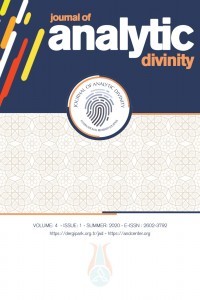Sistematik Din Sosyolojisi ve Max Weber
Din sosyolojisi, Max Weber, Protestan, Ahlak, Kapitalizm
Systematic Sociology of Religion and Max Weber
Sociology of religion, Max Weber, Protestant ethic, Capitalism.,
___
- Akalin, Kürşat Haldun. “Dinsel Rasyonalistlerde Seçilmişlik Güdüsü ve Bireysel Sorumluluk Duygusu”. Bolu Abant İzzet Baysal Üniversitesi Sosyal Bilimler Enstitüsü Dergisi 17/2 (2008), 1-18.
- Akalin, Kürşat Haldun. “Max Weber’in Yorumunda Meslek Ahlakı Olarak Dünyevi Asketikizm”. Dokuz Eylül Üniversitesi Sosyal Bilimler Enstitüsü Dergisi 14/2 (2012), 11-32.
- Apalı, Yasemin. “Weber’de İktisadi Zihniyete Sosyolojik Bir Bakış”. Hukuk ve İktisat Araştırmaları Dergisi 10/1 (t.y.), 73-86.
- Armet, Stephen. “Religious Socialization and İdentity Formation of Adolescents in High Tension Religions”. Review of Religious Research. 2009, 277-297.
- Bellah, Robert N. “Max Weber and World-Denying Love: A Look at The Historical Sociology of Religion”. Journal of the American Academy of Religion 67/2 (1999), 277-304.
- Bodur, H. Ezber. “Modern Kapitalizmin Doğmasında Dinin Rolü (Kapitalizmin Ruhu ile Protestan Ahlâkı Arasındaki İlişki)”. Atatürk Üniversitesi İlahiyat Fakültesi Dergisi. 9 (1990), 80-108.
- Boudon, Raymond. The Origin of Values: Reprint Edition: Sociology and Philosophy of Beliefs. New York: Routledge, 2017.
- Connolly, William E. Capitalism and Christianity, American Style. Durham: Duke University, 2008.
- Davie, Grace. “The Evolution of the Sociology of Religion”. Handbook of the Sociology of Religion, Ed. Michele Dillon. Cambridge: Cambridge University Press, 2003, 61-76.
- Davie, Grace. The Sociology of Religion: A Critical Agenda. New York: Sage, 2013.
- Davis, Winston. “Din Sosyolojisi”. Ankara Üniversitesi İlahiyat Fakültesi Dergisi 45/2 (2005), 291-307.
- Eşki, Hülya. “Bugünü Anlamak İçin Max Weber’i Yeniden Okumak”. Uluslararası Yönetim İktisat ve İşletme Dergisi 6/11 (2012): 187-198.
- Gorski, Philip S. "Historicizing the Secularization Debate", Handbook of the Sociology of Religion, Ed. Michele Dillon. Cambridge: Cambridge University Press, 2003, 112-113.
- Hughes, John. The End of Work: Theological Critiques of Capitalism. New York: Wiley & Sons, 2008.
- Kızılçelik, Sezgin. Sosyoloji Teorileri. Konya: Tasarım Yayıncılık, 1994.
- Kobya, Murat. “Din Sosyolojisinde Dini Davranış Kuramları”. Abant İzzet Baysal Üniversitesi İlahiyat Fakültesi Dergisi 3/5 (2015), 50-63.
- Kundakçı, Deniz. “Weber’deki Marksizm: Genel Ekonomi Tarihi Üzerine Mukayeseli Bir Giriş”. Toplum ve Bilim 112 (2008), 205-226.
- Kurt, Abdurrahman. “Sosyolojik Din Tanımları ve Dine Teolojik Bakış Sorunu”. Uludağ Üniversitesi İlahiyat Fakültesi Dergisi 17/2 (2008), 73-93.
- Kurt, Abdurrahman. “Weber’in İslam Görüşü Üzerine Bir Değerlendirme”. Uludağ Üniversitesi İlahiyat Fakültesi Dergisi 19/1 (2010), 1-23.
- Lehmann, Jennifer M. Deconstructing Durkheim: A Post-post Structuralist Critique. New York: Routledge, 2013.
- Mardin, Şerif. Din ve İdeoloji. İstanbul: İletişim Yayınları, 2016.
- Okumuş, Ejder. “Toplumsal Değişme ve Din”. Elektronik Sosyal Bilimler Dergisi 8/30 (2006), 323-347.
- Riesebrodt, Martin. “Charisma in Max Weber’s Sociology of Religion”. Religion 29/1 (1999), 1-14.
- Rosati, Massimo. Ritual and the Sacred: a Neo-Durkheimian Analysis of Politics, Religion and the Self. New York: Routledge, 2016.
- Sunar, Lütfi. “Weber’in İktisat Sosyolojisi: Uygarlığı Anlamanın Anahtarı Olarak İktisadi Zihniyet”. Sosyoloji Konferansları. 45 (2012), 19-42.
- Şengül, Fatma Nur. “Max Weber ve İslam”. Journal of Analytic Divinity 1/1 (t.y.), 83-100.
- Tarakçı, Muhammet. “Kalvinizm’de Kader Anlayışı”. Uludağ Üniversitesi İlahiyat Fakültesi Dergisi 19/2 (2010), 66-92.
- Torun, İshak. “Max Weber’e Göre İktisadi Zihniyetin Rasyonalizasyonu”. Sosyal Ekonomik Araştırmalar Dergisi 8/15 (2008), 14-34.
- Turner, Bryan S. “Islam, Capitalism and the Weber Theses”. The British Journal of Sociology 25/2 (1974), 230-243.
- Turner, Bryan S. Max Weber: From History to Modernity. New York: Routledge, 2002.
- Wach, Joachim. Sociology of Religion. New York: Routledge, 2019.
- Weber, Max. Economy and Society, Ed. Guenther Roth - Claus Wittich, London: University of California Press, 1978.
- Weber, Max. Protestan Ahlakı ve Kapitalizmin Ruhu. Trc. Zeynep Gürata. Ankara: Ayraç Yayınları, 1999.
- Weber, Max. The Protestant Ethic and the Spirit of Capitalism. New York: Routledge, 2013.
- Weber, Max. The Sociology of Religion. New York: Beacon Press, 2017.
- Yanıklar, Cengiz. “Tüketim Kültürü, Kapitalizm ve İnsan İhtiyaçları Arasındaki İlişki Üzerine Bir Tartışma”. Cumhuriyet Üniversitesi Edebiyat Fakültesi Sosyal Bilimler Dergisi 34/1 (2010), 25-32.
- Yayın Aralığı: Yılda 2 Sayı
- Başlangıç: 2017
- Yayıncı: Özcan GÜNGÖR
Kahramanın Yolculuğu Miti Çerçevesinde Mantıku’t -Tayr Adlı Eserde Hakikat Arayışı
Arap Dilinde Taaccüb İfade Eden Kalıplar
Talim’ül Müteallim, Yazar: İmam Burhaneddin Ez-Zernuci (İstanbul: Şifa Yayınevi, 2008)
Talcott Parsons’un Sosyal Teorilerinde Din
Stuart MEWS, Çevirmen: Abdullah YARGI
Nitelik Bağlamında Kur’an Tilâvetinin Keyfiyeti ve Eğitimi Üzerine Bir İnceleme
Necib Mahfuz’un Kısa Öykülerinde Türk Figürü
Had Kavramının İslami İlimlerde İfade Ettiği Anlam ve Kur’an’da Hudûdullah Kavramı
